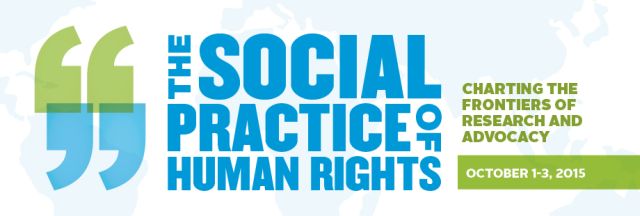
Location
1700 South Patterson Building; see printed schedule for room number
Start Date
10-2-2015 1:00 PM
End Date
10-2-2015 2:00 PM
Abstract
In this session, presenters and attendees will discuss different dimensions of the question, "Does All Human-Rights Funding Use a Human Rights-based Approach?"
In the U.S., grant strategies and decisions have historically been made by individuals and funders behind closed doors, with little transparency and accountability. Grant seekers, not to mention the public at large, have rarely had insight into how those decisions are made or any influence on the process. What criteria are they using? To whom are they accountable? And how do they make their decisions about what and who they are going to fund?
Replacing traditional hierarchical models of funding, participatory grantmaking applies a human rights-based approach to how funding is determined and who makes the funding decisions. The emphasis is on the practice as well as on the impact of the funds. In this participatory panel presentation, moderated by a staff person from the International Human Rights Funders Group (IHRFG), panelists and audience will explore a range of models for transforming the relationship of social justice actors with funders.
Included in
Peace and Conflict Studies Commons, Policy Design, Analysis, and Evaluation Commons, Policy History, Theory, and Methods Commons, Politics and Social Change Commons, Work, Economy and Organizations Commons
Roundtable: Does All Human-Rights Funding Use a Human Rights-based Approach?
1700 South Patterson Building; see printed schedule for room number
In this session, presenters and attendees will discuss different dimensions of the question, "Does All Human-Rights Funding Use a Human Rights-based Approach?"
In the U.S., grant strategies and decisions have historically been made by individuals and funders behind closed doors, with little transparency and accountability. Grant seekers, not to mention the public at large, have rarely had insight into how those decisions are made or any influence on the process. What criteria are they using? To whom are they accountable? And how do they make their decisions about what and who they are going to fund?
Replacing traditional hierarchical models of funding, participatory grantmaking applies a human rights-based approach to how funding is determined and who makes the funding decisions. The emphasis is on the practice as well as on the impact of the funds. In this participatory panel presentation, moderated by a staff person from the International Human Rights Funders Group (IHRFG), panelists and audience will explore a range of models for transforming the relationship of social justice actors with funders.



Comments
Matthew Hart is a founder and principal at the Paris-based firm the Lafayette Practice, which specializes in advising on philanthropic strategy and management. TLP supports organizations from grassroots nonprofits and NGOs to International Foundations in planning and implementation; institutional partnership building; development and fundraising strategy; public relations; marketing; and relationship management. Additional resources:
Jason Franklin is the W.K. Kellogg Community Philanthropy Chair at the Dorothy A. Johnson Center for Philanthropy, based at Grand Valley State University in Grand Rapids, Mich. It uses a systems-based, comprehensive approach to serving nonprofits, foundations, and others seeking to transform their communities for the public good.
Diana Samarasan is the founding executive director of the Disability Rights Fund, which supports organizations for people with disabilities in the developing world to take the lead in advocating for the human rights of persons with disabilities at local and national levels, using the mechanism of the Convention on the Rights of Persons with Disabilities.
Mona Chun is executive director of the International Human Rights Funders Group, a global network of donors and grantmakers committed to advancing human rights around the world through effective philanthropy.
Katy Love is a senior program officer with Wikimedia Foundation, a nonprofit charitable organization dedicated to encouraging the growth, development and distribution of free, multilingual educational content, and to providing the full content of these wiki-based projects to the public free of charge. The Wikimedia Foundation operates some of the largest collaboratively edited reference projects in the world, including Wikipedia.
This biennial conference provides a unique space for scholars, practitioners and advocates to engage in collaboration, dialogue and critical analysis of human rights advocacy — locally and globally. Learn more about the Human Rights Center at the University of Dayton >>>.